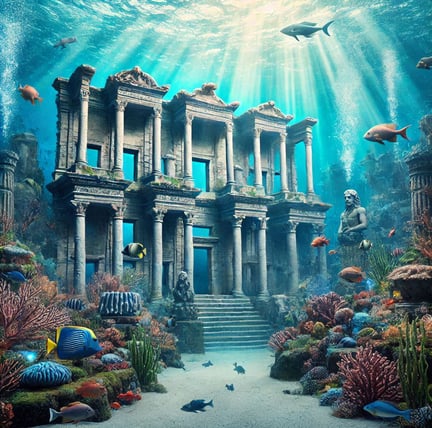The Lost City of Atlantis: Fact or Fiction?
Explore the enduring mystery of the Lost City of Atlantis. Delve into its origins, theories of existence, and historical connections. Perfect for history enthusiasts and mystery lovers alike.
WiserFool
The Lost City of Atlantis – Fact or Fiction?
The Lost City of Atlantis has captivated the human imagination for millennia. Described as a powerful and technologically advanced civilization that mysteriously disappeared beneath the waves, Atlantis continues to be a subject of fascination and debate. Is it a historical reality, a mythological allegory, or something in between? This blog explores the origins, theories, and enduring allure of Atlantis, delving into both historical accounts and modern interpretations.
Origins of the Atlantis Legend
The earliest known reference to Atlantis comes from the works of the ancient Greek philosopher Plato. Around 360 BCE, Plato mentioned Atlantis in his dialogues, Timaeus and Critias. According to Plato, Atlantis was a powerful island nation located "beyond the Pillars of Hercules" (the modern Strait of Gibraltar). He described it as a utopian society that excelled in engineering, architecture, and the arts, boasting immense wealth and advanced technologies.
According to Plato, Atlantis eventually fell out of favor with the gods due to its hubris and moral decline. This divine punishment led to Atlantis being submerged into the ocean in a single day and night of catastrophic events. Plato's account suggests that he may have used the story of Atlantis as an allegory to convey philosophical and moral lessons about human nature, governance, and the dangers of excessive pride.
Theories and Interpretations
Over the centuries, numerous theories have emerged about the possible existence and location of Atlantis. Here are some of the most prominent ones:
Historical Basis: Some scholars believe that Atlantis may have been based on a real historical event or location, such as the Minoan civilization on the island of Crete. The Minoans were an advanced society that experienced a catastrophic volcanic eruption on the nearby island of Thera (Santorini) around 1600 BCE. This event caused widespread destruction and may have inspired the legend of Atlantis.
Mythical Allegory: Many historians and scholars argue that Atlantis is purely a mythological creation of Plato. They suggest that Plato crafted the story as a literary device to illustrate his philosophical ideas about ideal societies, moral decay, and the consequences of human hubris.
Lost Civilization: Some proponents of alternative history and pseudoscience believe that Atlantis was a real, technologically advanced civilization that existed in prehistoric times. They propose various locations for Atlantis, including the Caribbean, Antarctica, and even the Sahara Desert. These theories often rely on speculative interpretations of ancient texts and geological evidence.
Psychological Archetype: Carl Jung, the renowned psychologist, proposed that Atlantis could be seen as an archetype—a symbol deeply embedded in the collective unconscious of humanity. According to Jung, the story of Atlantis resonates with universal themes of a golden age, the fall from grace, and the longing for a lost paradise.
Modern Exploration and Popular Culture
The legend of Atlantis has continued to thrive in modern times, thanks in part to its portrayal in popular culture. Books, movies, and documentaries have kept the mystery of Atlantis alive, often blending historical speculation with imaginative storytelling. Notable works include Jules Verne's 20,000 Leagues Under the Sea, Disney's Atlantis: The Lost Empire, and numerous television series exploring the enigma.
In addition to its cultural impact, the search for Atlantis has led to various scientific and archaeological expeditions. Researchers have explored the depths of the Mediterranean, the Atlantic Ocean, and other potential locations in search of clues. Despite these efforts, no conclusive evidence has been found to confirm the existence of Atlantis.
Conclusion
The Lost City of Atlantis remains one of the most enduring and enigmatic legends in human history. Whether it is a historical reality, a mythical allegory, or a psychological archetype, Atlantis continues to captivate our imagination and curiosity. Its story serves as a reminder of the timeless themes of human ambition, moral integrity, and the quest for knowledge.
As we continue to explore the mysteries of our past, the legend of Atlantis will undoubtedly remain a symbol of the enduring human spirit and the allure of the unknown. Whether fact or fiction, Atlantis challenges us to seek understanding and wisdom in the face of mystery.


